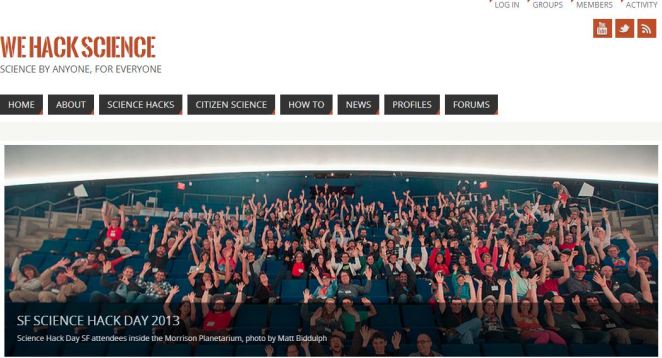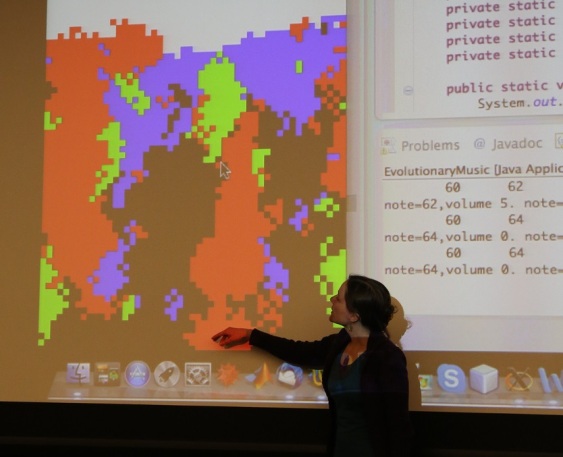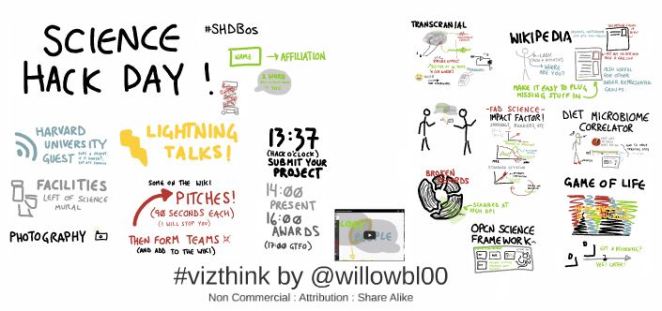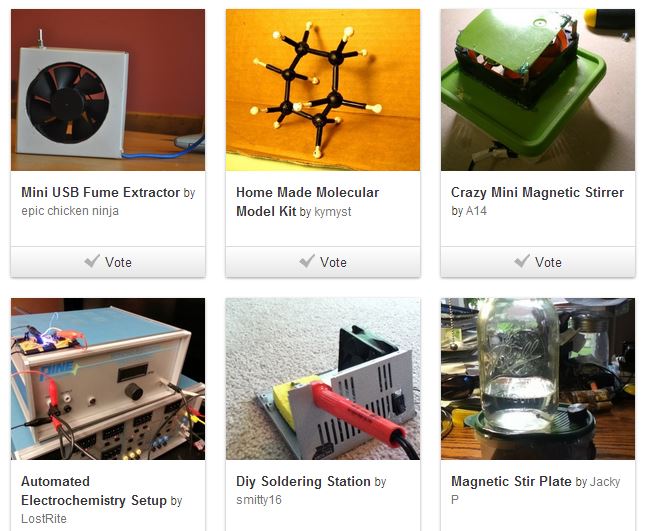We’d like to thank everyone who came out and all our sponsors for making it an awesome event. You can see a recap on Storify here: sfy.co/q012M
SHD Boston 2015
Science Hack Day is back in Boston!
Science Hack Day will be happening on January 24-25, 2015 at the MIT Media Lab, in Cambridge, MA. The weekend will include cool hacks, cool people, and hopefully you! Edit: The event starts at 10am on Saturday 1/24; a full schedule can be found here!
For attendees: Stay tuned to this site, and/or follow @SHDBos on Twitter for updates. A detailed information and signup page will be launching soon.
For potential sponsors: Check out the sponsors page.
Boston’s first Science Hack Day – congrats and thanks!
We held the first Science Hack Day in Boston this last weekend, October 19-20th in B-100 and B-103 of Northwest Labs, on the Harvard campus. It was a blast!
After hearing exciting lightning talks and project pitches on Saturday morning, groups formed around a huge variety of different interests, including transcranial stimulation, cellular automata, the human gut microbiome, and the language of science communication.
The next 24 hours was filled with discussions, brainstorming, prototyping, coffee, and couch naps. A few inspirational die-hards hacked on their project all night long!
On Sunday afternoon, groups demonstrated their work to judges, who named their favorites.
Tied for Grand Prize: Wikipedia Women in STEM
Women are underrepresented in Wikipedia, both as editors and within articles. In an impressive solo effort, Jessica McKellar built Wikipedia Women in STEM, “a proof of concept project that programmatically identifies Wikipedia articles on women in STEM that lack important basic features, making it easy for casual contributors to take on bite-sized projects.”
Tied for Grand Prize: A “Laser” phonograph
The Harvard Poetry Archive needs a way to screen through lots of unlabeled lacquer discs that are too fragile to be played mechanically. Many are likely to be uninteresting, so it would be too expensive and time-consuming to digitize them all with state-of-the-art technology. However, some contain things like Robert Frost reading his own work. To find these, this group developed image processing tools to convert grooves in a record to sound files so that anyone with a commercial photo scanner can digitize old records. At the time of the presentations, the audience was able able to hear a second-long snippet of (clearly musical) sound they had extracted from one groove, but they didn’t stop there. Stay tuned for more exciting updates from this group!
In addition the two grand prize winners, judges also named two honorable mentions.
.Honorable mention: Fads and Impact Factor
What’s considered hot in science? This team found that the answer to that question changes rapidly from year to year. They developed a tool to look at the relative impact factor of PubMed keywords over time. Using this, they showed that many fields rise and fall out of glamour journals with alarming speed.
The topic of Impact Factor was also touched on during Christina Szalinski’s talk the previous day.
Honorable mention: Open Source Collaboration Software: File Previews
This group worked to extend the file preview capabilities of the Center for Open Science’s Open Science Framework. It’s a collaboration tool that allows scientists to archive and share data in a variety of formats, and several file types were added this weekend!
Congratulations to all the hackers! Watching the feed of the presentations below, you’ll be able to see why the judges had a difficult time deciding on winners. You can also read about all the awesome hacks here.
In addition to the fantastic groups that presented hacks, we have many people and organizations to thank!
- The generous sponsors who made this possible: FAS Center for Systems Biology, NSF Physics of Living Systems, American Society for Cell Biology, swissnex Boston, Wyss Institute, HMS Postdoc Office, and Boloco.
- Our fantastic speakers: Dan Novy, Buz Barstow, Michael Baym, Melissa Lewis, Sikander Hayat, Christina Szalinski, and Jose Gomez-Marquez.
- Our judges: Pamela Silver, Professor at Harvard Medical School, Henry Holtzman, Vice President at Samsung, Jessica Rosenkrantz, Creative Director of Nervous System, and Jesse Louis-Rosenberg, Chief Science Officer of Nervous System).
- My co-organizer Willow Brugh, for all her guidance and help with every aspect of the planning process, and for her amazing facilitation skills during the event,
- Our patient and generous host Ethan Garner, who secured and coordinated our beautiful venue,
- Jenna Eun for her help with organizing publicity and sponsorship, and manning the registration desk together with Lyre Calliope
- My lab mates: Cameron Myhrvold for his photography skills, and Tyler J. Ford and Steph Hays for baking morale-sustaining brownies and an truly epic cake,
- Ariel Waldman for providing helpful advice!
And most of all, thanks to everyone who came to brainstorm, hack, and observe!
We are already looking forward to the second Science Hack Day in Boston, which we’re planning for next year! To be notified with registration opens, please sign up here. If you’re interested in helping with organizing or sponsorship, please email me at jessica.polka@gmail.com.
vizthink summary and video feeds of Science Hack Day Boston!
What an awesome weekend! Many thanks to everyone who participated – hackers, speakers, judges, sponsors, and observers. A thorough wrap-up will follow soon – for now, take a look at Willow’s amazing vizthink summary, which includes sketches of the demoed hacks!
A video feed of some of the opening talks, our hangout with Science Hack Day Guelph, and hack presentations are also on her YouTube channel!
Register at the door for Science Hack Day Boston!
If you’ve been vacillating on coming, please do! We’re got a huge number of attendees registered, but spots are still available.
Registration starts at 10am in B-100 of the Northwest Building (map below) – we’ll have bagels, coffee, and a chance to mingle and start planning hacks. Then at 11, we have a great lineup of speakers, followed by rapid-fire project pitches. After that, it’s 24 hours of designing, coding, building, and prototyping on projects that involve science. The full schedule is here. To get a feel for what people are talking about doing, check out our wiki for discussing hack ideas!
Instructables contest for DIY lab equipment
From Instructables and Tekla labs (which “enables scientists to construct their own high quality lab equipment using readily available, off the shelf items”) comes a truly awesome contest that’s perfect for science hackers: Build My Lab.
Tekla Labs has surveyed twenty labs from countries throughout Latin American and Africa to identify the specific equipment needs of researchers around the globe. We found that over 50% of researchers surveyed are in need of and would be willing to build their own:
microscopes, media rotators, fluorometers, sterilization equipment, spectrophotometers, PCR machines, incubators, water baths, hot plate/magnetic stirrers, pH meters, electrophoresis chambers, sonicators, UV lamps, tissue culture hoods, centrifuges, and ELISA plate readers.
By submitting a design for one of these pieces of equipment to our Instructables competition, you are not only eligible to win one of our grand prizes AND a 3D printer, but also will be providing a real life solution for a researcher in need!
A community of science hackers

The first Science Hack Day was held in London in June of 2010. Since then, dozens have followed, all across the world. In fact, this weekend, there’ll be a Science Hack Day in Guelph as well as Boston. We’re planning to set up a video portal between the two sites!
Yesterday, David Harris launched a beautiful website that will connect people interested in science hacking, citizen science, and changing scientific practices on a grander scale. wehackscience.org features forums, news articles, and resources for this community. Check it out!
Hack ideas wiki highlights
Science Hack Day Boston is now less than a week away, and some participants are starting to plan their hacks! There’s over a dozen on the wiki now, including:
- Lego springs to Life (a Mindstorm liquid handler)
- Automate biometric data annotation (pulling out REM cycles from EEG data, etc)
- Open-access alternatives search tool (for suggesting alternatives to paywalled content)
Got an idea? You can make an account and add it to the wiki here.
Curious about Science Hack Day? Come watch the presentations
If you only have a limited amount of time this weekend, but want to see what Science Hack Day is all about, we welcome you to come watch the final hack presentations at 2pm Sunday 10/20 in room B-103 of 52 Oxford Street (Harvard Northwest Building). No registration is required for this!
If you can come hack with us, registration is here!









